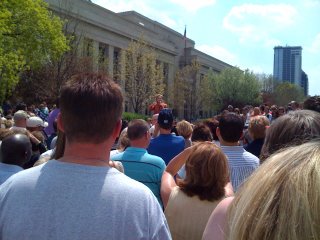Voter ID Law Is Bad for Democracy (Update 6)
I still haven't had a chance to work my way through the Supreme Court's opinion in the voter ID case, but I did want to mention the editorial "Supreme vote of approval protects balloting system" in today's The Indianapolis Star. Allow me to (briefly?) take issue with several points made by the Star's editorial staff:
The U.S. Supreme Court's decision to uphold Indiana's voter ID law is a step forward in protecting the integrity of the voting process. It's also a victory for good sense.
First, I'm not sure that I understand how the law is a "step forward in protecting the integrity of the voting process" when there was absolutely no evidence whatsoever in the history of the State of Indiana of any voter fraud that this law would prevent. Second, I'm not sure that taking time to pass laws and then litigate them all the way to the Supreme Court in order to prevent a non-existent problem makes good sense. Third, I don't think that the law is a step forward when it does not address the types of voter fraud that have been documented.
Providing an ID is a common requirement of modern life, from cashing a check at a grocery store to picking up prescription drugs at a pharmacy. Asking a voter to flash an ID before participating in one of the most important responsibilities befalling a citizen is a reasonable safeguard against those who would violate the public's trust through voter fraud.
Let me first quote my thoughts on this argument from my post Voter ID Law Is Bad for Democracy (Update 2):
Voting is different; it is not the same as flying on a plane, renting a video, or even opening a bank account. Voting is an essential function -- perhaps, the essential function -- of a citizen in a democracy. Minor inconvenience might be acceptable in certain situations, but not situations that go to the very heart of the functioning of the democracy and certainly not when that inconvenience is caused, not for the purpose of preventing an abuse that is not occurring, but rather to disenfranchise certain voters who are more likely to vote for candidates of a particular ideology.
I'm all for reasonable safeguards, but when they are being applied to core constitutional rights and to the very framework upon which our democracy rests, then those "reasonable safeguards" must really address the perceived problems (i.e. voter fraud) without unreasonably disenfranchising the most vulnerable citizens. Given that there is no evidence of in person voter fraud (which the law addresses) and there is evidence of other types of fraud (for example, in absentee balloting) that the law does not address, then I don't think that the voter ID law is a "reasonable safeguard" at all.
Indiana's voter registration rolls, until recently, were grossly inaccurate, carrying the names of deceased residents, former voters who had moved out of state, and duplicate names of people who were registered in more than one county. The opportunity for fraud was clearly evident.
While the above is a true statement, it misses one very critical point: Indiana's voter ID law will not address any of these issues (other than preventing a deceased voter from showing up and voting). A voter who has moved could still show up and vote as could a voter registered in multiple counties. And, given that the law does not address absentee balloting which is much more prone to fraud (and is where past examples of fraud have occurred), it seems that we should still be concerned rather than pacified by the current law. For that matter, what is to stop someone with a fraudulent ID from registering to vote in the first place?
It's also hard to argue that the law has discouraged people from voting; voter registration in Indiana has surged in the past two years. More people than ever are participating in the process.
This statement is simply idiotic. I wonder why voter registration has "surged". Could it be because the race between Sen. Obama and Sen. Clinton is drawing record voting turnout in primaries throughout the nation? Could it have anything to do with public dissatisfaction with incumbent legislators at all levels of government and/or dissatisfaction with the Governor? Could it have anything to do with the continued war in Iraq, property taxes, gas prices, health care costs, or any of the other issues confronting Hoosier voters? And, just because voter registration has "surged", how do we know that the law has not discouraged or disenfranchised voters? That many new voters may plan on going to the polls does not somehow balance out the hardships that may now prevent others from going to the polls. And, if the number of potential voters who are disenfranchised is low, does that mean that they simply aren't important enough to worry about? Are we really telling them that because they are few in number their votes are somehow less important?
If our General Assembly was truly interested in the integrity of the voting process and the functioning of democracy, it would pass voting rights legislation that would make it easier for citizens to vote (keeping the polls open longer would be a great start) while addressing the real problems in the voter registration process and record keeping. Or, if the General Assembly is intent on keeping the voter ID law, then perhaps we could pass legislation to simplify the process of obtaining an appropriate government ID without cost to taxpayers. But, I don't think that Republicans in the General Assembly are interested in anything more than increasing their own turnout while decreasing Democratic voter turnout.
Somehow we keep forgetting that voting is the core function of the citizenry in a democracy. Around the world, people kill and die for the right to vote. Here in America, we take voting for granted to such an extent that we don't seem overly concerned when we deprive some of our own of that very right when we do so in the false name of "integrity".







